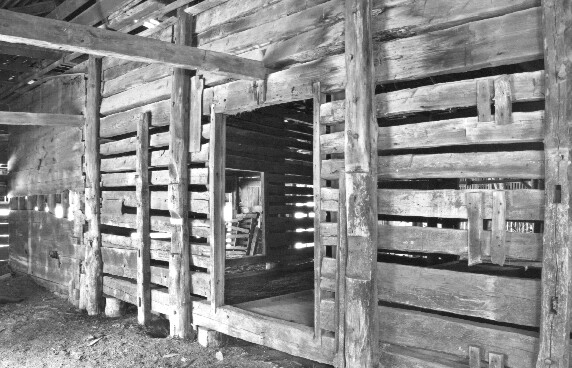Historic Preservation Non-Capital grants provide support for wide variety of research,
survey, planning, and educational activities involving architectural, archaeological, or
cultural resources. Eligible activities may include preservation plans, historic and cultural
resource surveys, educational outreach programs, and National Register nominations. In
recent years, funding totaling $300,000 has been distributed from Maryland Heritage Areas
Authority funding to the Maryland Historical Trust for non-capital grants.Eligible Applicants
The Historic Preservation Non-Capital Grant Program provides grants of up to $75,000 to
nonprofits (state and federal government entities may apply as nonprofits) and local
jurisdictions. Local jurisdictions must provide a dollar-for-dollar match in cash or in-kind
contributions.
 Bond-Simms Tobacco Barn, Greenwell State Park. Photo by
William Graham, Colonial Williamsburg Foundation, 2007.
Bond-Simms Tobacco Barn, Greenwell State Park. Photo by
William Graham, Colonial Williamsburg Foundation, 2007.
Eligible Projects
Grants are available for research, survey, documentation, conservation, planning and educational
activities involving historic, architectural, archaeological or cultural resources (i.e., the
tangible remains of Maryland's past). Common grant projects include, but are not limited to:
- Architectural and archaeological survey;
- Historic structures reports;
- Historic American Buildings Survey documentation;
- Documentation of oral traditions and cultural heritage as it relates to historic places,
especially in underserved communities;
- Nominations to the National Register of Historic Places;
- Historic contexts and thematic studies;
- Enhancement of qualifying archaeological collections (curation is ineligible);
- Projects to identify, evaluate, and prioritize cultural resources to aid in planning for
emergency response actions;
- Educational materials directly related to architectural, archaeological, or cultural resources;
- Programs designed to engage the public in Maryland archaeology, historic preservation, and
cultural conservation;
- Publications summarizing Maryland’s architectural, archaeological, and/or cultural history at
the statewide and regional level; and
- Preservation plans, feasibility studies, and assessments for properties listed in or eligible
for listing in the National Register of Historic Places.
In FY 2026, special priority will be given to:
- Broad-based and comprehensive archaeological or architectural surveys (as opposed to surveys
of limited or "development-defined" areas);
- Projects designed to assess, document, or address the impacts of natural disasters, ongoing
natural processes, and/or climate change on threatened resources; and/or
- Projects that undertake in-depth architectural or archaeological study of a specific topic,
site, time period, or theme.
Applications for projects that address these priorities will receive special consideration in the
application ranking process. Interdisciplinary projects are encouraged!
Applicants are strongly encouraged to contact MHT staff prior to application submission to discuss
project eligibility and the proposed scope of work.
Other Requirements
For assistance in developing a scope of work and budget for your proposal, please contact the MHT staff
member responsible for your project discipline: